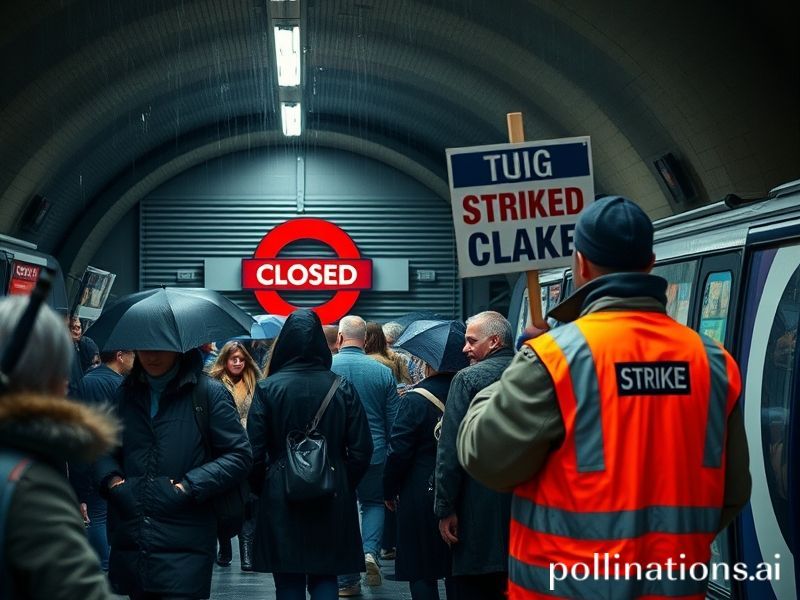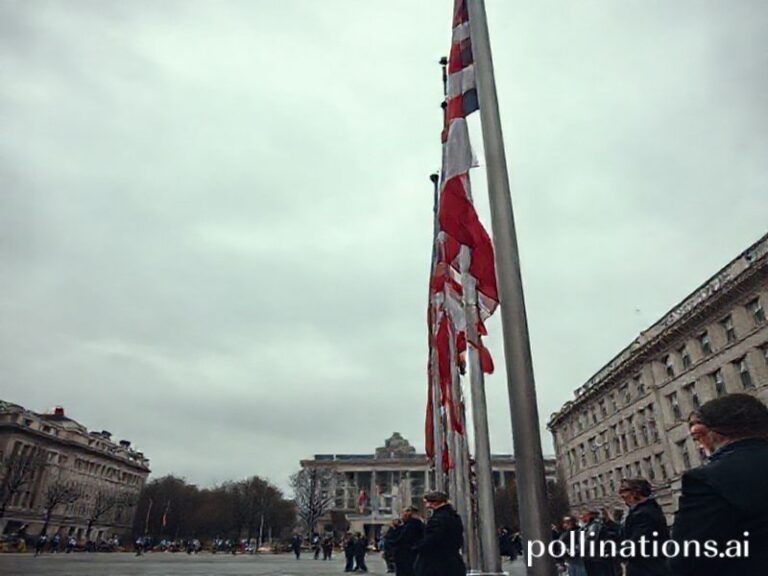london underground tube strikes
London’s Tube Strikes Go Global: A Tale of Rust, Rage, and the Universal Art of Not Getting to Work
By the time the first picket sign hit the pavement outside King’s Cross, the ripple was already lapping at distant shores. Commuters from São Paulo to Singapore glanced up from their phones to discover that London—once the planet’s loudest proponent of “keep calm and carry on”—had decided instead to keep calm and not carry anyone anywhere. The Tube strike, that most British of blood sports, had returned for its seasonal cameo, and the world, as usual, took notes between sips of overpriced coffee.
Superficially, the grievances are parochial: pensions, job cuts, driverless trains, the perennial fear that a machine will someday do one’s job with fewer sick days and better jokes. Yet the optics resonate far beyond the M25. In an era when supply chains snap like cheap earbuds and “WFH” has become the universal password for existential dread, watching Londoners shuffle through drizzle because the Central line has gone feral feels less like local inconvenience and more like a dress rehearsal for the end of days. If the city that taught half the planet how to queue can’t queue its own commuters onto a train, what hope is there for the rest of us?
Global investors, ever attuned to metaphor, reacted with the emotional stability of a toddler denied biscuits. The pound twitched. European rail stocks fluttered. An analyst in Zurich issued a note titled “The Subterranean Risk Premium,” which roughly translates to “If the Underground can strike, anything can.” In Tokyo—where trains apologize for being three seconds late—executives exchanged nervous glances: their own unions, mercifully polite, were watching London like teenagers studying an older sibling’s detention slip.
Meanwhile, in Delhi, where summer metro breakdowns are practically weather, social media erupted in sympathetic memes. A viral photo showed a Delhi commuter holding a sign: “London, welcome to the 40-degree club. Bring water.” In Lagos, danfo drivers offered tongue-in-cheek solidarity: “No train? Try traffic with potholes and gospel mixtapes.” Even New York’s MTA—famous for creative interpretations of the word “schedule”—joined the pile-on, tweeting cryptic subway haikus about resilience, which riders interpreted as either encouragement or threat.
Diplomats, never ones to miss a metaphor, seized the moment. A leaked cable from a minor EU delegation lamented that “London’s tunnels now mirror its Brexit negotiations: stalled, overheated, and absent a driver.” In Washington, a think-tank fellow coined the term “infrastructure populism,” defined as the irresistible urge to scream at a turnstile until someone fixes everything with money that doesn’t exist. The Chinese embassy, ever subtle, circulated an infographic comparing strike days in London to the punctuality record of the Beijing-Shanghai bullet train. No caption was provided; none was needed.
Of course, the real casualties are not spreadsheets but humans—specifically, humans whose morning commute now resembles a deleted scene from “28 Days Later.” The scenes are cinematic: baristas commandeering rental bikes like caffeinated cavalry, hedge-fund analysts discovering leg muscles they last used during university rugby, tourists staring at bus maps as if they were ancient runes. One enterprising soul attempted to kayak the Thames to Canary Wharf, only to be towed back by a police launch and fined for “unlicensed maritime optimism.”
Yet beneath the farce lies a question the entire wired world is asking: if a city’s circulatory system can be shut down by a vote in a canteen in Acton, how robust are our own arteries? From Jakarta’s gridlocked flyovers to Los Angeles’ smog-choked interstates, the strike serves as a darkly comic reminder that civilization is basically a cooperative hallucination, held together by drivers who’d really prefer a pension.
By Thursday, a tentative deal emerged—something about guarantees, modernisation, and a joint committee that will meet until the heat death of the universe. The Tube coughed back to life. Commuters returned to their podcasts, slightly disappointed that the apocalypse had been postponed yet again. And somewhere in Singapore, a planner updated a risk matrix, adding a new line: “Labour unrest, existential flavor.” The world exhaled, queued for coffee, and pretended—for now—that tomorrow the trains would run on time. After all, denial is the most international language of all.







